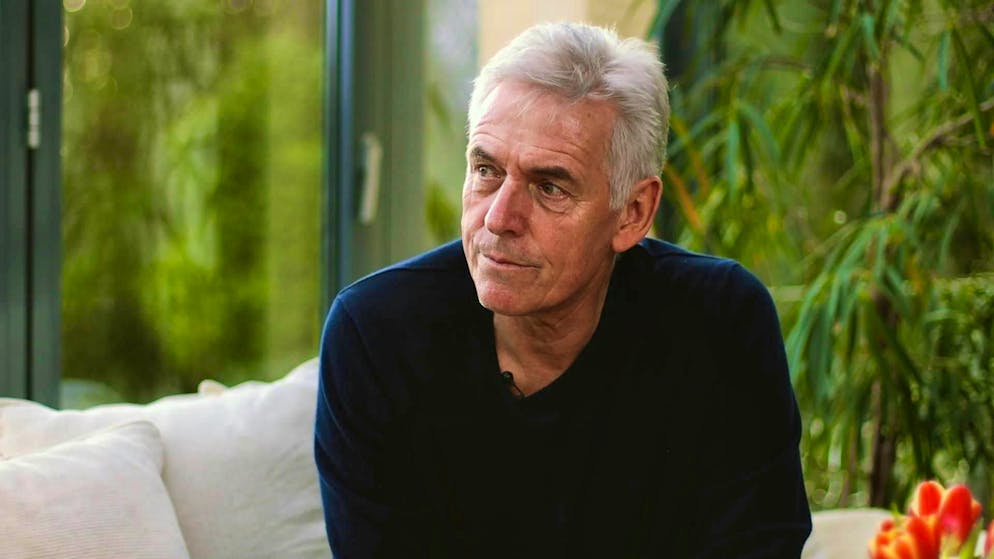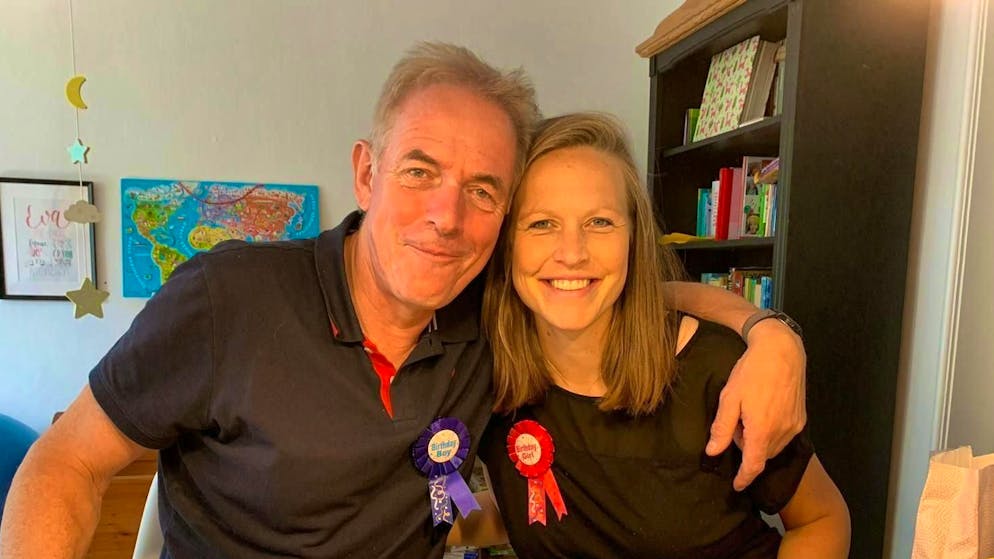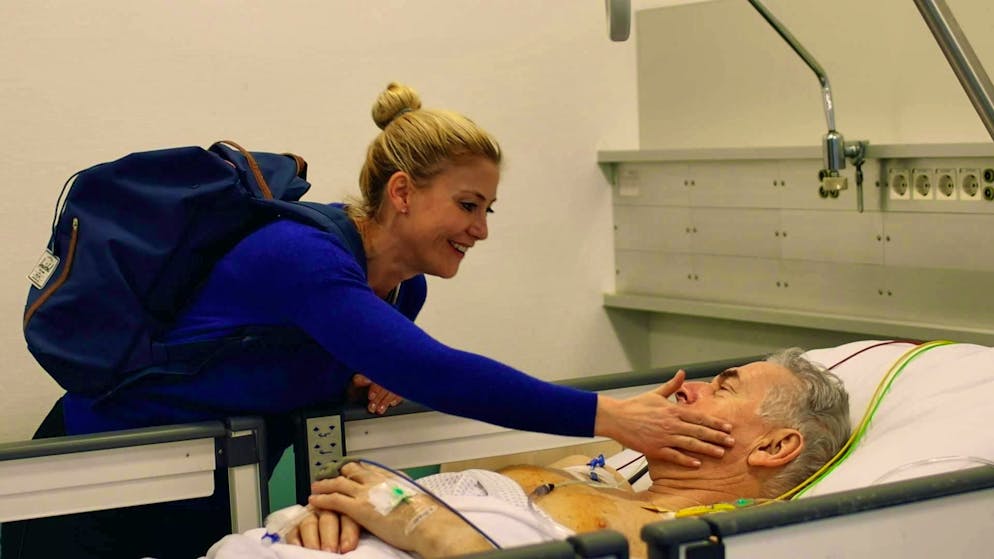"I feel completely fit" Burkard Kress lives without a stomach after shock diagnosis
Bruno Bötschi
10.8.2024

How can a father bear this? Burkhard Kress loses his son to cancer. Then it becomes clear: the journalist has inherited the disease. It is not the family's only stroke of fate. Kress now lives without a stomach.
No time? blue News summarizes for you
- TV viewers know Burkhard Kress from the RTL program "Extra".
- In 2023, the reporter lost his 30-year-old son to a rare form of stomach cancer.
- After the loss, investigations revealed that the cause of the cancer was a genetic predisposition that father Kress had inherited.
- As a result, Burkhard Kress's stomach had to be removed. Now the journalist tells his story in the RTL program "Extra Spezial: Krebs - Warum meine Diagnose Ihr Leben ändern kann".
Cancer is one of the most insidious diseases of all: in Switzerland alone, around 42,000 people are diagnosed with it every year.
RTL reporter Burkhard Kress knows what it means to lose a loved one to the disease: in 2023, his son died of a rare form of stomach cancer at the age of just 30. Shortly afterwards, Burkhard Kress also received the devastating diagnosis.
In "Extra Special: Cancer - Why my diagnosis can change your life", the now 65-year-old journalist tells his life story. The 60-minute program can be seen on RTL on Monday, August 12 at 10.35 pm.
A laparoscopy brings the sad certainty
According to Burkhard Kress, his son had been complaining of abdominal pain since 2015. At the time, the doctor had advised him to avoid alcohol, coffee and hot spices.
Lactose intolerance was also suspected. Initially, his condition seemed to improve, but the abdominal pain returned in 2022. The GP consulted suspected gastritis.
When the pain became more severe, the young man was admitted to hospital, where further examinations were carried out, but the doctors continued to rule out cancer: The blood values, they said, were too good. A laparoscopy then brought the sad certainty.
"Finally, on December 9, we got a call from his girlfriend," recalls Burkhard Kress: he and his wife were told to come to Leipzig immediately. Their son wanted to tell them the diagnosis in person. It was: "Diffuse stomach cancer with signet ring cells, and it was incurable."
Lara Kress: "Dad, I've got it too!"
The worrying time for the Kress family continued with the death of their son: "One day after his death, the University of Leipzig called me and said: 'We have examined the case in detail and can now say that this cancer is due to a CDH1 gene mutation'," recalls the reporter.
As a result, all members of the family had to be tested for this gene mutation. Kress' wife's result came first: "Negative! So there were now two possibilities: Either I am positive or the mutation originated in my son," explains Kress.
He continues: "I remember the day I was in Ukraine for a report when my daughter called me crying: 'Dad, I've got it too! That was a terrible moment. And I knew that if she had it, then I had it too."

During a gastroscopy that was scheduled anyway, he had stomach samples taken from five different places, in accordance with the Cambridge protocol, because stomach cancer is almost impossible to detect without taking a sample, as "the entire stomach lining becomes a tumor," as Kress explains: "Two days before Christmas, I got a call: we've detected the stomach cancer at an early stage."
The RTL reporter began to investigate: He learned that a person can live without a stomach. On January 23, 2024, he had his stomach removed.
A subsequent examination revealed incipient carcinomas in seven areas of the removed stomach: "When I asked how long I would have had to live without the removal, the professor said: 'I can't tell you that. All I can tell you is that you came in time."
Kress meets people in rehab who are worse off
The operation was filmed and can be seen in the RTL program "EXTRA Spezial". The film also shows excerpts from the video diary that Burkhard Kress kept in hospital and during his subsequent rehabilitation.
During the cure, Kress met people "who were much worse off: with oesophageal cancer, with an artificial bowel outlet, with inoperable stomach cancer", but he did sport and was put on medication.
"Pancreatic enzymes are extracted from the pancreas of pigs, which I have to take because my pancreas no longer receives information from my stomach that it needs to secrete something."
Burkhard Kress is now doing well again. "I now have to eat a lot of meat because of the iron and vitamin B12 it contains," explains the RTL journalist, "but it works. I only recently came back from a very strenuous filming trip in Barcelona. I have to say: I feel completely fit."
Kress: "I'm one of the lucky ones"
The idea of being able to use his medical history to educate and warn people motivated him to bring the story to television.
"The great hope is that these genetic mutations can one day be controlled by vaccination," says Kress. The mRNA vaccines used for the first time during the coronavirus pandemic could be the key.
Kress' colleague Pia Osterhaus and his colleague Ingo Wickop also report on the current state of research in the TV documentary: at the German Cancer Institute in Heidelberg, they talk to leading experts about the latest methods for early detection.

Federal Health Minister Karl Lauterbach (SPD) and CSU politician Kerstin Schreyer, who has breast cancer herself, also have their say. Finally, Osterhaus and Wickop undergo a series of precautionary cancer examinations themselves. A colonoscopy reveals an unexpected finding.
Meanwhile, Burkard Kress tries to look to the future with optimism: "When you've had such a tragic fate, you appreciate every day."
He continues: "I'm one of those who was really lucky. But of course I would have preferred it if I could have warned my son through my illness."